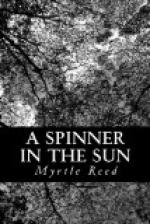Ghost-like, a long white chiffon veil trailed behind her, too securely fastened to her hat to be blown away. Even in the night, she watched furtively and listened for approaching footsteps, one hand holding the end of her veil in such a way that she might quickly hide her face.
Outside the gate she paused, irresolute. At the last moment, it seemed as if she could never enter the house again. A light snow had fallen upon the dead garden, covering its scarred face with white. Miss Evelina noted quickly that her garden, too, was hidden as by chiffon.
A gust of wind made her shiver—or was it the veiled garden? Nerving herself to her necessity, she took up her satchel and went up the path as one might walk, with bared feet, up a ladder of swords. Each step that took her nearer the house hurt her the more, but she was not of those who cry out when hurt. She set her lips more firmly together and continued upon her self-appointed way.
When she reached the house, she already had the key in her uncertain fingers. The rusty lock yielded at length and the door opened noisily. Her heart surged painfully as she entered the musty darkness. It was so that Miss Evelina came home, after five-and-twenty years.
The thousand noises of an empty house greeted her discordantly. A rattling window was answered by a creaking stair, a rafter groaned dismally, and the scurrying feet of mice pattered across a distant floor.
Fumbling in her satchel, Miss Evelina drew out a candle and a box of matches. Presently there was light in the little house—a faint glimmering light, which flickered, when the wind shook the walls, and twinkled again bravely when it ceased.
She took off her wraps, and, through force of habit, pinned the multitudinous folds of her veil to her hair, forgetting that at midnight, and in her own house, there were none to see her face.
Then she made a fire, for the body must be warmed, though the heart is dead, and the soul stricken dumb. She had brought with her a box containing a small canister of tea, and she soon had ready a cup of it, so strong that it was bitter.
With her feet upon the hearth and the single candle flickering upon the mantel shelf, she sat in the lonely house and sipped her tea. Her well-worn black gown clung closely to her figure, and the white chiffon veil, thrown back, did not wholly hide her abundant hair. The horror of one night had whitened Miss Evelina’s brown hair at twenty, for the sorrows of Youth are unmercifully keen.
“I have come back,” she thought. “I have come back through that door. I went out of it, laughing, at twenty. At forty-five, I have come back, heart-broken, and I have lived.
“Why did I not die?” she questioned, for the thousandth time. “If there had been a God in Heaven, surely I must have died.”
The flames leaped merrily in the fireplace and the discordant noises of the house resolved themselves into vague harmony. A cricket, safely ensconced for the Winter in a crevice of the hearth, awoke in the unaccustomed warmth, piping a shrill and cheery welcome, but Miss Evelina sat abstractedly, staring into the fire.




